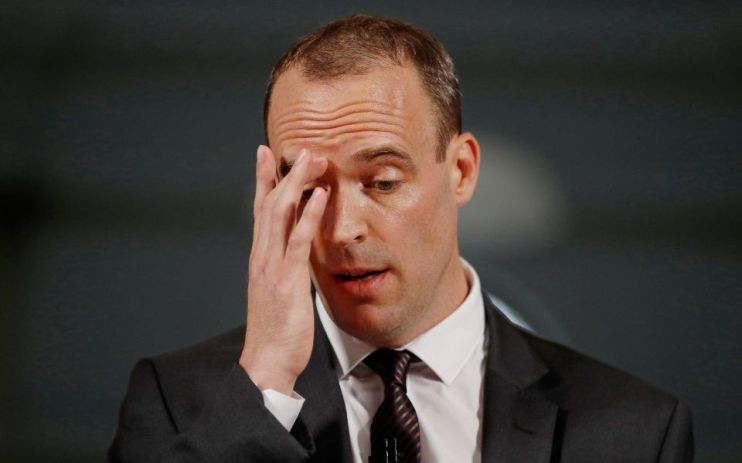Foreign Secretary Dominic Raab to intervene in case over £1.4bn of gold deposited in the Bank of England

In a case that is set to determine the fate of almost £1.4bn of Venezuelan gold deposited in the Bank of England, UK’s Foreign Secretary Dominic Raab has been granted permission to intervene at the Supreme Court during a hearing scheduled for next month.
The case at the highest court in the land is between the Central Bank of Venezuela (BCV) and the administration set up by Venezuelan opposition leader Juan Guaidó, who challenges the authority of the BCV board to deal with Venezuela’s overseas assets.
After a loss in the Court of Appeal, Guaidó is seeking to overturn a judgment that found that both the incumbent Venezuelan President Maduro and Guaidó could be recognised by the UK government in different capacities.
The Supreme Court hearing is scheduled for 19 July, and permission has now been granted for the Foreign Secretary’s legal representatives to make submissions regarding the case before the case at the highest court begins.
The legal battle so far
The BCV, represented by London litigation boutique Zaiwalla & Co, had filed a claim in May 2020 against the Bank of England in order to access part of the approximately £1.4bn of Venezuelan gold deposited in London.
The BCV wants to sell around €1bn of those foreign reserves so that the proceeds can be transferred to the United Nations Development Programme to procure humanitarian aid, medicine and equipment needed to fight the Covid-19 pandemic in Venezuela, the Venezuelan government has said.
After a High Court judgment in July 2020 determined as a preliminary question that the then foreign secretary Jeremy Hunt’s statement recognising Juan Guaidó as “constitutional interim President of Venezuela” was unambiguous and binding on the Court under the “one voice” principle, the Court of Appeal in October disagreed and granted the BCV’s appeal, directing that the case should return to the High Court.
The Court of Appeal concluded that absent a clear indication from the UK Government that Guaidó was recognized not only as the de jure Head of State of Venezuela, but also the de facto Head of State, the English Court would need to conduct a detailed factual inquiry.
This would include evidence of the UK’s existing diplomatic relations with Venezuela and other relevant factors, to determine whether Maduro continues to exercise de facto powers of head of state and head of government in Venezuela.
Finally, in December 2020, Guaidó’s representatives were granted permission to appeal to the UK Supreme Court, and the court has agreed to determine the appeal on an expedited basis. The Foreign Secretary was invited to intervene in the proceedings.
14 months on
“This case encompasses many vital questions of public policy, and our client looks forward to the Supreme Court resolving these. All three levels of court have been understanding of the urgency and importance of this case, and expedited proceedings,” said Leigh Crestohl, partner at Zaiwalla & Co, acting for the Banco Central de Venezuela.
By the time the Supreme Court hearing occurs, it will be 14 months since BCV was compelled to start these proceedings to access its gold reserves for the benefit of the Venezuelan population during a global pandemic,” he added.
Guaidó’s legal position
The argument put forward by Guaidó’s representatives that he is answerable to neither Venezuelan nor English law was highlighted by the Court of Appeal as having a ‘certain irony’ given that Guaidó’s claim to legitimacy as “interim president” was said to arise from the Venezuelan Constitution.
The BCV disputes the legitimacy of Guaidó’s claim, which was rejected by the Venezuelan Supreme Tribunal of Justice as invalid and unconstitutional.
A key principle of the rule of law is that nobody is above it, and it simply cannot be consistent with the rule of law for a purported head of government or head of state to claim that his acts are not reviewable by an English Court, according to legal experts.
It should be upheld as effective even when the highest court in Venezuela has ruled them to be unconstitutional and illegal.
In January 2021, Guaidó ceased his functions as a deputy and President of the National Assembly of Venezuela after not standing in the 2020 elections. He claimed his purported authority as interim President as continuing from his former role, giving him a questionable constitutional standing to continue in this litigation.
Next month
The Supreme Court hearing is currently scheduled to take place on 19 July. The Supreme Court will hear the Appeal from Guaidó’s side, as well as a cross-appeal from the BCV’s Board.
Arguments will centre on the issue of recognition raised in the proceedings, and whether previous statements made by the Foreign and Commonwealth Office should be interpreted as conclusive recognition of Guaidó by the UK Government in a way that prevents continued recognition of President Maduro de facto.